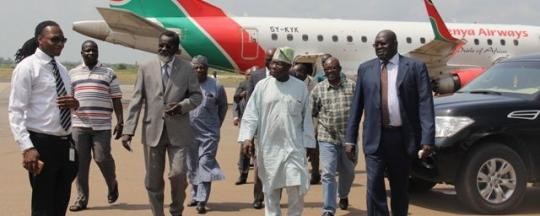African Union to leave comment on S Sudan atrocities for final report

The African Union Commission of Inquiry on South Sudan said that massacres documented throughout the country will be included in its final report.
Speaking at a press conference in Juba after a five-day fact finding mission to South Sudan, commission chairman and former Nigerian president Olusegun Obasanjo said the final report will include findings into various atrocities that took place throughout the country during the seven month civil war.
Asked why the commission's interim report had not mentioned atrocities committed in Juba in December, Obasanjo responded, "We said we will come out with full report. After Juba massacre, you can also talk of Bor massacre, you can also talk of Bentiu massacre, you can talk of Malakal massacre. So all these impunities must be stopped. So they will be taken together in our final report.”
The Commission's interim report, released earlier in July, only spoke generally about mass graves and witnesses to crimes.
AU can "only help"
On its third visit to South Sudan, the Commission met with President Salva Kiir as well as the heads of the military, police, and national intelligence. The panel also met with women's groups and the governor of Central Equatoria state for "another angle" on the conflict, according to a press statement.
When asked the AU's stand on stopping the ongoing conflict in South Sudan, Obasanjo said that ultimately the role of the African Union is "only help" and that it is up to the South Sudanese to determine their own fortunes or misfortunes.
"AU and international community will continue to do its own best but really the countries in Africa will be the ones who will take the responsibility for preventing conflict...in their own countries," he said.
Holding perpetrators accountable
Members of the Commission dismissed recent criticism from the American Bar Association (ABA) that the AU group "lacks credibility."
The ABA has accused the Commission of being "an attempt to prevent or deflect an International Criminal Court process" against South Sudan's leaders and recommended an alternative investigative body.
In response to the allegation, commission member Mahmood Mamdani, a professor at Makarere University in Uganda and Columbia University in the United States, said: "It seems to me that a body of lawyers would at the minimum wait for the report of this commission before passing judgment. The fact that they have passed judgment even before the commission has issued any documentation means that their judgment is preconceived."
The African Union has been deeply critical of the ICC of late, accusing the Hague-based court of only targeting African leaders. Currently, the presidents of Sudan and Kenya are accused by the court of committing crimes against humanity.
Mamdani in his personal capacity has also disapproved of the ICC's apparent focus on African leaders. Speaking today as a member of the AU commission, the Ugandan academic said any accountability measures used against South Sudan's leaders should be applied globally.
"The important thing is that whatever measures we arrive at on the question of accountability these should be globally applicable, there should be no special accountability for African situations and African countries, whatever measure is arrived at for Africa should be applicable elsewhere in the world."
Mamdani stressed that accountability should not be considered a standalone goal.
"The mandate of the commission centers a number of objectives, accountability is one. Healing, reconciliation, and reforms are another, so we have to think of accountability in the broader conflict," he said. "We have to think of accountability in a way which makes reconciliation possible and opens up possibilities for reform."
Photo: Deputy Foreign Minister Bashir Gbandi (center-left, in suit) welcomes former Nigerian President Olesegun Obasango (center-right, in white) to Juba on 20 July. Credit Radio Tamazuj.
Related: Law experts say S Sudan government has 'no will, no capacity' to investigate atrocities
To contact Radio Tamazuj with information, use the contact form on our website. To join the discussion, follow us on Facebook.